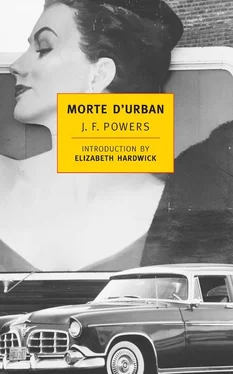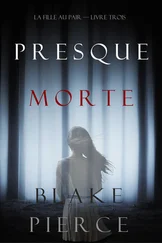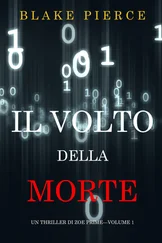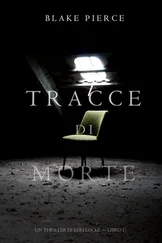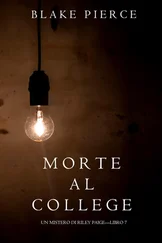The country beyond Minneapolis seemed awfully empty to him, flat and treeless, Illinois without people. It didn’t attract, it didn’t repel. He saw more streams than he’d see in Illinois, but they weren’t working. November was winter here. Too many white frame farmhouses, not new and not old, not at all what Father Urban would care to come home to for Thanksgiving or Christmas. Rusty implements. Brown dirt. Gray skies. Ice. No snow. A great deal of talk about this on the train. Father Urban dropped entirely out of it after an hour or so.
The Voyageur arrived in Duesterhaus a few minutes before eleven that morning, and Father Urban was the only passenger to get off. Since the Order’s new foundation was not in but near the town, he went into the station to ask about a taxi, rather doubting that there would be one in such a place as Duesterhaus appeared to be. The station agent, writing at his desk, seemed unaware of him. An old dog lying behind the counter woke up and gave him a look that said, Can’t you see he’s working on his report?
“I’d like to call a taxi, if I may,” said Father Urban, giving the town the benefit of a doubt, and then he waited.
Presently the agent got up and came to the counter. He pushed the telephone at Father Urban and tossed him a thin directory. “Cost you a dime to call,” he said.
The dog opened its eyes, as if it wanted to see how Father Urban would take the bad news.
Father Urban put a dime on the counter.
The dog closed its eyes.
“Under Herman,” said the agent, going back to his desk.
The directory was for Olympe, the nearest town of any size, but Father Urban discovered the Duesterhaus numbers in the back pages. “Herman’s Hardware is all I find here.”
“Yeah, well, that’s it.”
A woman answered the phone at Herman’s and said he’d have to wait awhile. He told her who he was and where he wished to go, thinking this might help, but it didn’t. (The woman had to mind the store, and her husband, besides being in the hardware and taxi business, was also an undertaker, she said, and as such would be occupied for the next hour.) Father Urban put another dime on the counter and called the Order of St Clement — the foundation was so listed in the directory. He hadn’t done this before because he preferred to arrive under his own power. There was no answer. He picked up the dime.
“How far is it out to the Order of St Clement?” he asked the agent.
“The Home? About a mile.”
Father Urban felt that they were talking about the same place, but that the agent was trying to be difficult. “Like to leave my luggage and call for it later.”
“We can’t be responsible.”
“I understand.” Father Urban went over to his traveling bag and attaché case, intending to carry them back to the agent for safekeeping.
“Leave ’em there. As safe there as anywhere.”
Father Urban moved the pieces away from the door. Then he decided to take the attaché case with him, remembering that a dog had once wet on it in Pittsburgh. He asked the way to his destination, this time referring to it simply as “St Clement’s.”
“The Home?”
“Have it your way.”
“To the stoplight, and turn right.”
“Much obliged,” said Father Urban, wondering what ailed the man and thinking that if this was how the town welcomed a priest there was plenty of work to do there.
Duesterhaus was a one-stoplight town. New and old yellow lines ran at cross purposes on the pavement, marking a recent change from diagonal to parallel parking. The main street was a state highway. The drugstore was the bus station.
Father Urban came to the stoplight and was in no doubt that he should turn right. Here, however, an old yokel in overalls stared with such curiosity that Father Urban, as a favor to him, asked the way out to the Order of St Clement’s place.
“Better ask inside, Reverend.”
Father Urban nodded and kept going. He wasn’t — whatever the old fool might think — afraid to enter a tavern, but he didn’t have to prove it to himself or anyone else. Dear God, the situations you could find yourself in! What he needed was a peg or two from the silver flask in his attaché case. On second thought, that was not what he needed. Many a good city man had gone down that drain. Yes, and even worse fates, it was said, could overtake a city man in desolation — women, insanity, decay.
He passed a cemetery, Protestant. Father along the road, he saw a rabbit take off into the cornstalks. It would be something, he thought, if he could learn the ways and habits of animals, could read their tracks in the snow, could tell the flowers and trees by their leaves, the birds by their eggs—“So you thought this was an owl egg, did you, Johnny?”—and could take more of an interest in the weather, too. He had read that there were subtle pleasures to be had from all this. Perhaps. Too bad he couldn’t begin then by enjoying his hike. The wind was getting to him, though. He wasn’t dressed for the great outdoors, and to walk faster, he felt, might be an invitation to the invisible dogs barking the news of his coming from farm to farm. What if he had to run for it? Wouldn’t it be better to stand his ground and beat them off with his attaché case until help arrived? Too late. Hounds. Mastiffs. Dead, perhaps eaten. Anything could happen here.
What if, when he reached the summit of the long rise he was climbing, there was still nothing? What if the station agent had lied to him? That would be going pretty far, yes, but from what he’d seen of the agent, it wasn’t out of the question, and later the man would simply deny everything. You turned right? I said left. The joke would be on the stranger. The dog would laugh. No other witnesses. No recourse. Father Urban trudged on, almost resigned to the idea that he’d been betrayed by the first man he’d met in Duesterhaus.
And then he was standing still on top of the long hill, looking down, seeing what he had finally come to. About fifty yards up from the shore line of a frozen lake (the other end of which he had seen in Duesterhaus and then lost sight of and forgotten) stood two sizable structures, one an ornate old mansion of gray stones, mansard roof, and a heavy brown beard of vines, the other a long, low red-brick affair, the obvious product of fairly recent times. They were as different in their architecture as a steam packet and an ore boat. Sheds and cribs and coops seemed to stir at their moorings whenever the wind blew hard, and perhaps some of them did. Chickens and pigs might have figured in the economy of the place at one time. There was no telling what did now. There was no sign of life.
A board bore the legend ORDER OF SAINT CLEMENT in green paint. The lettering was sharp and elegant, worthy of a tombstone, but the colors, green on cream, didn’t do much for each other, and the sign, besides being nailed to a tree, had been peppered with shot, so that the over-all effect was rather like FRESH EGGS FOR SALE.
He left the blacktop road for the dirt one leading down. Under closer scrutiny, the low red-brick building appeared to be unoccupied. He heard a cracking noise — the first suggestion of life about the place — and went in the direction of it. In a field, at some distance from him, a muffled figure was moving slowly through the dead grass and weeds, through the haze. Father Urban coughed. The figure, that of a man, rounded on him. When Father Urban saw the gun, a rifle, he feared for his life, thinking this was some half-witted yokel — who, having been given hunting privileges, and having killed a stranger, would get off scot free at the inquest.
“Never do that,” the man called out.
“Hello, Wilf. I wouldn’t have known you.”
“Game make a noise like that sometimes,” said Father Wilfrid, who, on account of his broad nose and padded cheeks, had been called Bunny in the Novitiate. Bunny Bestudik. He wore a very long coat of rich devil’s-food brown, with a collar of pearly nylon fleece. His headpiece, though, was soft and black with an olive cast to it, genuine fur, which, in places, looked as though it had just been licked by a cat. He was a few years younger than Father Urban and had a sandy look.
Читать дальше
